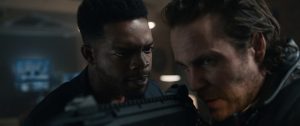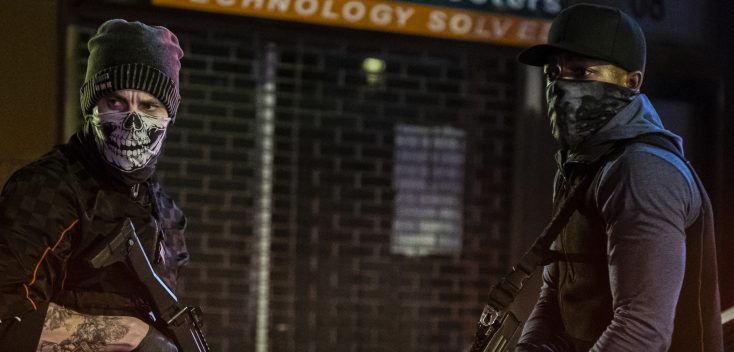
By ANGELA DAWSON
Front Row Features
HOLLYWOOD—A pair of Canadians play small time New York thieves who become subjects of a massive manhunt after they stumble upon a massive cache of cocaine and wind up killing several cops as they try to make their escape in the action thriller “21 Bridges.”
Taylor Kitsch, 38, best known for his roles in military action drama “Lone Survivor,” and playing cult leader David Koresh in “Waco,” stars alongside fellow Canuck Stephan James, 25, who notably played Olympic champion Jesse Owens in “Race,” and starred in last year’s highly acclaimed “If Beale Street Could Talk.”
Kitsch plays the fictional Ray, an old-school ex-military type who hails from the roughest part of the Bronx, and James plays Michael, whose older brother was killed in action while serving with Ray overseas. Michael now views Ray as a surrogate big brother and follows him into harebrained schemes like knocking over a drug dealer’s stash of cocaine for money. What neither of these knuckleheads realize is that there is a lot more coke than they anticipated when they hit the target, triggering a massive police presence that responds just a little too quickly to the armed robbery. The result is a bloody shootout in which eight officers are killed. The film is helmed by veteran TV director Brian Kirk, who directed a handful of “Game of Thrones” episodes and created and directed the acclaimed British TV crime drama “Luther,” “21 Bridges” is based on an original screenplay by Adam Mervis and Matthew Michael Carnahan.
Hot on their heels of Ray and Michael following the robbery and shooting is New York police detective Andre Davis, played by “Black Panther” star Chadwick Boseman. The detective, the son of a policeman killed in the line of duty years earlier, is known to have a “trigger finger,” but his crime-solving skills are equally legendary in the ranks, so he is put in charge of bringing the perpetrators to justice. In an effort to corner the crooks, Davis calls for a complete shutdown of exits out of Manhattan, which includes the island’s many bridges. But he and his fellow investigator (played by Sienna Miller) have only a few nighttime hours to track down the cop killers before the entryways to the city have to be reopened. “21 Bridges” is time-ticking cat-and-mouse drama with an unexpected twist.
Playful and charming, Kitsch and James sat down for an interview to promote “21 Bridges.” They spoke about playing their fictional onscreen characters, prepping for their roles and how this gig compares to other roles, where each has depicted real life people onscreen.
Q: This film required a lot of physical stamina on your part. What was your preparation process like?
Stephan James: A lot of stretching. You’ve got to make sure you warm up those muscles so you don’t get cramps. There was a lot of running. I know a thing or two about running. So, I was definitely prepared. And, of course, the gun training. Taylor and I got to train with S.W.A.T. in Brooklyn. On Day 1, we were firing live rounds, learning to trust each other, and going to the gym.
Taylor Kitsch: We didn’t have a ton of prep time. You can’t force chemistry so we were kind of lucky to have it right away, which is good. I was kind of worried because we’re in every scene together. But I’d heard amazing things about him beforehand.
James: (quips) I didn’t hear the greatest things about Taylor.
Kitsch: I know. It’s a wild card. I sat down with (Brian) Kirk before and worked through the emotional beats and trying to get the action, primary, through the whole thing, and serving that. That was the biggest thing we were working on.
Q: Did you not have an opportunity to prep together?
Kitsch: We had one day with the N.Y.P.D. and some S.W.A.T. guys.
James: We had to learn a lot on that day.
Kitsch: You can see in the film, there’s a lot of close quarter gun fighting. You can’t screw around with that kind of stuff, so the trust is even enhanced through that.
Q: Your characters show us the range of how bad you can be? What was your motivation in how they would be?
James: It’s a little bit of desperation. That’s the only things these guys know. If it had been for these cops knocking on the door (of the restaurant where the drugs were hidden), we would have made it out, and everything would have been all-good. Obviously, the stakes become so much higher when you have to shoot your way out of a situation like that and, suddenly, when you thought something was one thing turns into a completely different thing and you have to decipher who’s bad and who’s good.
Kitsch: Michael and Ray do some pretty reprehensible stuff but with any character you’re trying to add layers and understand the “why” behind it. If Ray were here, he’d probably give you dozens of reasons why he does what he does. With J.K. Simmons’ character too—he has some amazing scenes where (the story) is just flipped on its head and you understand why the other side is doing what they’re doing.
Michael and Ray come from nothing and they see this opportunity (to score a cache of cocaine), which is once in a lifetime, and you have the paths that these guys have come through, you kind of understand it, and that’s where it kind of goes to ****.
Q: How was it working with director Brian Kirk?
Kitsch: I love Brian. I told him this morning (at the press junket) that I’d love to work with him again. He gave us a lot of freedom. Just sitting down with him during those first meetings, he asked us where we wanted to take this. He asked us what sticks out to us. So, that was great.
James: It was definitely freeing working with an actor’s director. He always allowed us to find ourselves within these characters never, of course, forgetting this is a big action film, but these guys are real guys too and there’s a humanity to them. So, he wasn’t afraid to let us explore.
Q: Shooting on location, were the locals friendly?
Kitsch: (laughs) We shot this primarily in Philly but I don’t think anyone on the block we were shooting in (was happy). We were shooting nights and we had that crane moving around so I’m sure hearing that noise at night wasn’t awesome for sleeping.
James: Somebody threw a slice of pizza from one of the windows and yelled, “Get off our street!” (laughs)
Kitsch: Or they’d have the lights on too. Or, they would just come outside and watch, which I totally get.
Q: Any injuries?
Kitsch: (quips) I shot him in the leg.
James: I’m just getting over it.
Kitsch: It wasn’t intentional. No, but in those close-quarter sets you don’t ever want to screw around, even if you’re shooting blanks. You rehearse and rehearse and rehearse and make sure you know what’s going on, so I was pretty safe, thankfully.
Q: Was your previous weapons training helpful?
Kitsch: Yes, I was trained by Navy SEALS for “Lone Survivor,” so I feel pretty confident using weapons.
James: This was my first time but since then I’ve worked with guns again (on the Fox TV series “Shots Fired”). We visited lockers with hundreds of guns and you can have your pick of any one of them. Like Taylor, I think (the training) is something I’ll be able to use again in my career.
Q: What’s the take away?
James: I can play a gunslinger. Plus, I’ve still got my legs (he played Olympic champion Jesse Owens) so I’ve got the Tom Cruise thing going pretty well.
Q: What’s your position on assault weapons?
Kitsch: We’re Canadian so … My dad actually hunted but he wasn’t around so I wasn’t raised around guns. We had the front door open; that was the kind of neighborhood I grew up in. I live in Texas now, which is quite the opposite. I think it’s a very good thing to educate yourself about. Hopefully, you’ll never have to use one, obviously, but I think it’s a smart thing to know (how to use a gun) and be able to safety it and, at least, handle one if it ever comes down to it. A lot of guys in Texas have big ranches and I’ll go out and shoot at the ranch, so that’s fun.
Q: These are fictional characters you’re playing. How’s it different from when you’re playing a real person? Is there more material to call on and less that you have to come up with yourself?
James: To me, it’s night and day. There’s a different level of prep that goes into playing a real human being. You’re dealing with people’s legacies. You’re dealing with their families who may or may not be alive. I played John Lewis in “Selma,” who’s still alive. I knew I had to face John after him watching me portray him in a film. You’re taking in those things as you’re training to portray him as you’re going through it. Even, on the other end of the spectrum, when you’re portraying Jesse Owens, who’s dead, his legacy has lived on, obviously. His family is still alive. I’m close with his daughters still. There’s a different level of accountability that you have to them and to their legacies.
When you’re doing something like this that is original—not to say it’s easy—there’s obviously a lot more freedom we have and a lot more license we can take creatively to inform these characters.
Q: What did Congressman John Lewis say about your performance?
James: He’s always been sweet and supportive. He’s come out to see other premieres of mine. He’s honestly been a gem.
Q: Taylor, what has been your experience playing a real person verses playing a fictional character in this?
Kitsch: I think I’ve done it five or six times. Stephan gave an eloquent answer. It’s hard to tope that. For me, it’s changed a lot of perspective I’ve had on a lot of issues. Being part of “Lone Survivor” (based on an actual event about a group of Navy SEALS on a deadly mission in Afghanistan) sticks out. “Waco” (in which I portrayed David Koresh) sticks out. I’ve gotten close with Dan Murphy’s family—Dan, his father and Maureen, his mother. I talk to them once a month and still go and do the Mike Murphy Run on Long Island every year. I still visit his grave every year with Dan. And Marcus Luttrell (on whom the movie was based), he’s like a brother to me. That whole process has given back a lot more than I put in so I was very lucky to be a part of that. The Navy SEAL community has embraced me which is really cool because they’re the ultimate. So, it’s really that accountability and the way you prep that’s totally different.
“21 Bridges” opens nationwide Friday, Nov. 22.





